In Sondheim’s great anthem to a life in show business, “I’m Still Here”, the character of Carlotta Campion sings of her career ups — and downs:
Top billing Monday
Tuesday, you’re touring in stock
But I’m here
First you’re another sloe-eyed vamp
Then someone’s mother, then you’re camp
Then you career from career to career
I’m almost through my memoirs, and I’m here
And in another genius verse, she sings:
I’ve gotten through, “Hey, lady, aren’t you whoozis?
Wow, what a looker you were”
Or better yet, “Sorry, I thought you were whoozis
Whatever happened to her?”
I’m often left wondering: Whatever happened to whoozis?
As someone who, for the last forty years, has mostly lived his life in the theatre, I’m forever saying it about big discoveries I’ve made there early in their careers, only to ‘disappear’ to far bigger fame in television. Since I never watched TV, until the pandemic recently forced me to, I’ve missed entirely the evolution of some people’s careers. (If they’ve transitioned to film, however, it is more likely to have reached my consciousness).
But some actors do sadly burn brightly early on, then do indeed basically vanish from the radar. And you only catch up again with them, sadly, in death.
One such actor was Marcus d’Amico, who died last month (on December 16), aged just 55, his sister reported on Instagram. She subsequently confirmed to Queerty that he died of pneumonia in Oxfordshire.
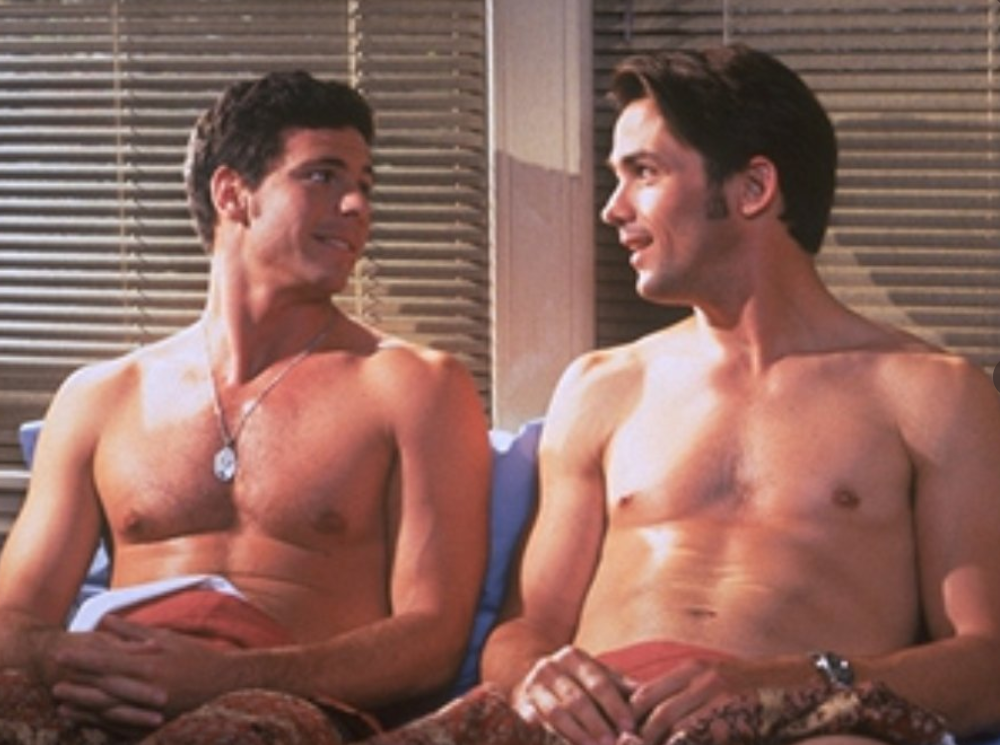
He’d begun his career on the West End stage as a child, appearing in the title role of Oliver! in 1977. As an adult actor, he was nominated for an Olivier for his performance as Louis in the original 1992 National Theatre production of Angels in America. And then in 1993, stardom beckoned when he played Michael Tolliver (a character known as Michael Mouse, pictured above left) in the original TV adaptation of Tales of the City.
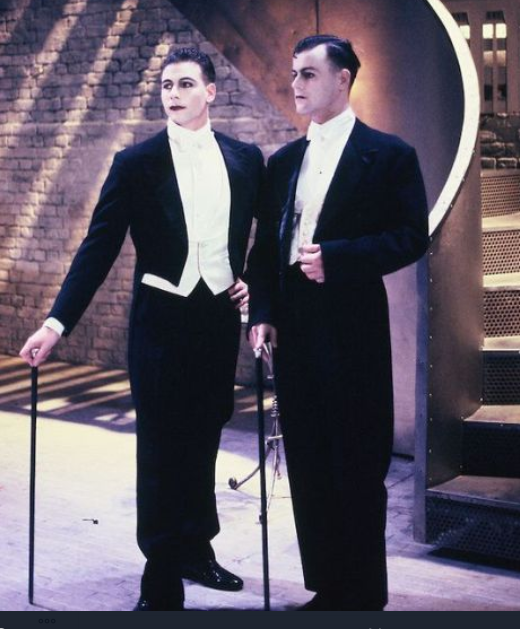
In 1994, he was headlining once again in the West End, starring opposite Rachel Weisz and Rupert Graves, in a transfer of the Donmar Warehouse production of Design for Living (above left, with Graves), in which he and Graves were newcomers to roles taken at the Donmar by Clive Owen and Paul Rhys.
But by the time a second series of Tales of the City was filmed in 1998, he was replaced…. and his career never truly revived. In Patrick Gale’s 1999 biography of Tales of the City creator Armistead Maupin, there’s a vivid re-telling of an ugly situation on the set of the television series after d’Amico reportedly disavowed his sexuality, but Maupin has since said,
“Despite the rumours, it is not true that Marcus D’Amico wasn’t invited back because of issues surrounding his sexuality. The production team met Marcus and he expressed ‘ambivalence’ about returning to the role of Mouse. The director felt it was important to find someone who would enthusiastically embrace the role.“
d’Amico went on to make a few stage appearances, including playing Cassius in a production of Julius Caesar at the Young Vic in 2000 — which I’ll personally never forget for the fact that the senators all took an onstage naked shower after the assassination, and of which Nicholas de Jongh, so often obsessed with such matters, wrote in his review in the Evening Standard, “Not only did young British actors display bare buttocks, when they twice took showers on stage for no discernible reason. Their larger limitations were also cruelly exposed.” His last West End role, as far as I can work out, was appearing as one of the ‘dads’ in Mamma Mia! in 2004.
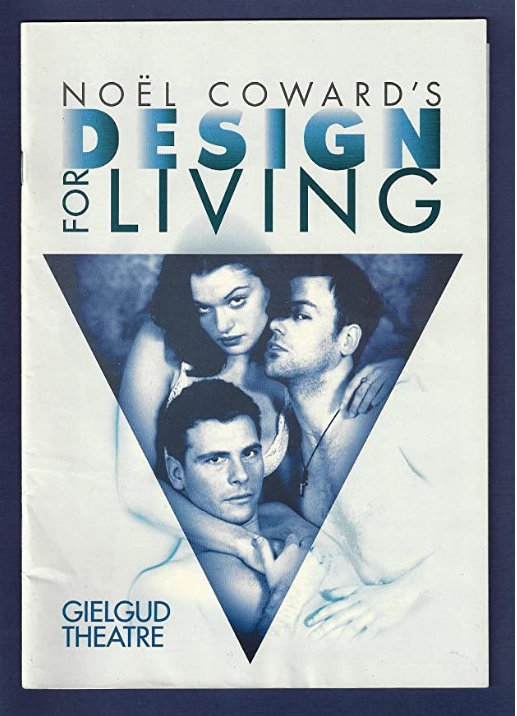
Stewart Who?, DJ and writer, revealed in a recent blog posting that as a tyro journalist on the former free gay scene weekly magazine QX he pursued, and secured, an interview with d’Amico during the run of Design for Living (programme pictured above). As he writes, “There was the tricky topic of sexuality. D’Amico had firmly remained in the closet and refused to discuss his relationship status. After dodging rumours and media intrusions for a year, it seemed unlikely that D’Amico would invite invasions to his privacy via a cult gay mag aimed at ravers and fetish fans. How did we get past his PR?”
But somehow he did: as he writes, “Perhaps it was the promise to put D’Amico on the cover. It’s quite possible that my stats on the QX readership were entirely fictional. Those details are a blur.”
The cover was itself remarkable: as he also explains, “An early ‘90s HIV/AIDS charity called the Red Admiral project was sponsored by QX. Their motif was a butterfly. When we put D’Amico on the cover, he was accompanied by a small rendition of the Red Admiral emblem, fluttering round his pretty head. The black and white image made him look like a cheery, but handsome entomologist. In reality, he was a gay man, hiding his sexuality, promoting a play concerned with sexual ambiguity, on the cover of a queer magazine, next to the logo of an AIDS project. It was complex, to say the least.”
But the story then takes a deeply personal turn. Some years later, Stewart Who?, by now a successful DJ, was at work in the West End venue Bar Code: “I spotted Marcus D’Amico sipping thoughtfully on a pint, as people danced, screamed and pushed past him. My eyes widened. The memory of our first meeting made my heart race. We got talking. Nobody recognised Marcus, as they knocked him out of the way to say hello to me or shout a request. He was insecure, slightly unhappy, but very entertaining and generous. It soon became clear he was keen on coming home with me.”
He did — and they became lovers. “Obviously, he no longer looked like the twinky ‘Mouse’ of Tales of the City. He was a strapping, hairy bear, careworn by life and struggling in his career. After that first night, he stayed at mine for days. We discussed theatre, literature, fame and failure.”
They became friends. “We met often, when he was in London. The topic of Armistead Maupin was never less than fraught. It was a dangerous scab to pick at. His frustration at an industry which had toasted his talent, then forgotten his existence was horribly palpable.” And he writes, “I know that whatever went down [on Tales of the City], in the long run, left Marcus emotionally damaged and lacking in confidence. I know. I briefly met him at the top of his game. Then dated him years later, when stardom was a painful memory. They were two different people.”
In one of the last emails they exchanged, d’Amico wrote to him saying this:
“I have always thought of you as the handsome, dangerous writer who came to my dressing room. Then I discovered you as DJ and gentleman. If only there had been even a few like you in the acting world I would have felt so much more at home there.”
It’s heartbreaking to think he was so conflicted. Whatever happened to whoozis? Now we know.
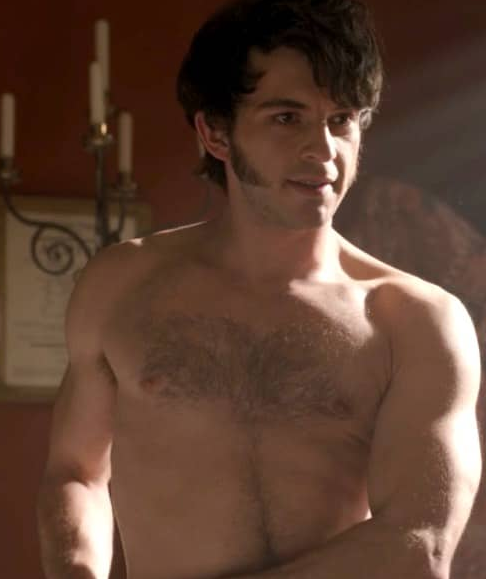
Meanwhile, another gay young actor Jonathan Bailey is causing hot flushes (from male and female viewers alike!) on TV’s Bridgerton, playing the strapping (and strappingly heterosexual) Anthony Bridgerton, who is trying to control his sister’s future in the show. He was previously known for his TV roles in Broadchurch and W1A, as well as on stage for appearances from Shakespeare at the National to the musicals The Last 5 Years (at the Other Palace) and Company (where he played Jamie, the suddenly nervous gay fiancé, who sings “Not Getting Married Today” to his partner, in a role that was re-gendered from Amy for this version).
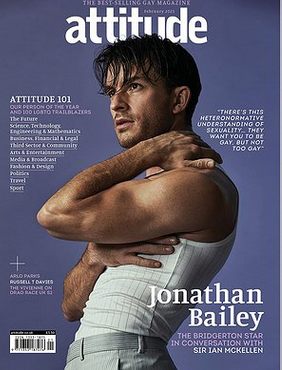
In a recent interview in Attitude magazine, he spoke about the challenges of coming out, even now, alongside veteran actor Ian McKellen.
“The most conservative conversations I’ve had about me being honest about my sexuality in this day and age have come from gay men in the industry, ‘Oh, no, you can’t come out. You shouldn’t really do that. If you do that, you’re going to have to…’ They’re either people who work in publicity, or there’s also been casting directors who have put the call into my agent to say, ‘Just so that you know, the way that this is going to be sold is that it’s a gay story written by gay writers for gay actors. So by just taking the role…”
And he added: “This was at a stage where perhaps I was coming to terms with my own sexuality, I hadn’t necessarily hidden it… But I’ve never been not honest about it. It’s just there had never been a need to talk about it. There’s a sense of shame, I think, that’s palpable throughout gay men within the industry. But then there’s also this heteronormative, heterosexual understanding of sexuality.”
McKellen tells him, “What I would hope for you is that your honesty about being gay, not having that secret, continues to bring you joy. But you place that, as far as your career is concerned, wherever you want it to be placed. You bring to the table, you bring to the workshop, you bring to the project, your life experience. And actually if you are gay, even now, you have experienced something about society which most people don’t have to bother about.”
If only Marcus d’Amico had managed to get a similar freedom. Interestingly, just as d’Amico had begun as a child actor, so did Bailey: when I interviewed him in 2016 for The Stage, he told me how he’d played Tiny Tim in an RSC production of A Christmas Carol in 1995 when he was just seven years old, and later Gavroche in Les Miserables. “I peaked really early as far as my nana is concerned!”, he told me. But also theatre was not exactly in his family blood. “My parents claim never to have gone to the theatre till the first night I appeared as Tiny Tim, yet they were so supportive of getting me to rehearsals in Clapham. My mum was working two or three jobs, and would have to drop me off!”
But while d’Amico only found discomfort in playing gay characters from Angels in America and Design for Living to TV’s Tales of the City, Bailey is entirely at home with who and what he is. His first London stage job, in fact, was doing a production of Jonathan Harvey’s Beautiful Thing. “On the day after my last A Levels, I started rehearsing for a production of Beautiful Thing in London, taking over from Andrew Garfield!”
